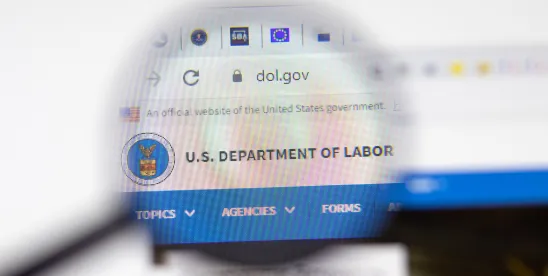On July 24, 2025, the U.S. Department of Labor’s Veterans’ Employment and Training Service (DOL/VETS) launched a program for employers to seek guidance for ensuring compliance with the Uniformed Services Employment and Reemployment Rights Act of 1994 (USERRA). The initiative is referred to as “SALUTE: Support and Assistance for Leaders in USERRA Training and Employment.” SALUTE creates an opportunity for employers to request technical guidance on USERRA-related questions or specific issues in their workforce before the onset of a DOL/VETS complaint or lawsuit.
Quick Hits
- On July 24, 2025, DOL/VETS launched the SALUTE program to help employers comply with USERRA.
- The SALUTE program allows employers to request technical guidance on USERRA-related issues, potentially averting DOL/VETS complaints or lawsuits.
- While the SALUTE program offers valuable compliance assistance, there are potential legal risks and privacy concerns associated with the use of advisory opinions in litigation.
The program may provide a unique opportunity for employers to obtain guidance on some of the thornier issues that can arise under USERRA. It may also carry legal risks depending on the extent to which advisory opinions from DOL/VETS may be used or weaponized in subsequent litigation.
Overview
USERRA is a federal law that applies to public and private employers. The statute provides reemployment rights up to five cumulative years for employees who are absent from their civilian jobs to perform voluntary or involuntary uniformed service. USERRA also prohibits discrimination in hiring, retention, promotion, and the administration of employee benefits, due to an individual’s past, present, or prospective military service affiliation or obligation.
DOL/VETS is the administrative agency charged with enforcing USERRA. The agency is also responsible for providing resources and training on USERRA, promoting veteran hiring initiatives, assisting transitioning service members, and providing technical assistance on veterans’ preference in federal employment.
Program Features
Under the SALUTE program, employers can request technical assistance as a proactive means of resolving USERRA-related questions or to address specific circumstances. DOL/VETS encourages employers to start with a review of specific USERRA compliance and training documents that are linked at the DOL/VETS website. Employers that still have questions may submit a request to VETS Compliance.
A request must include written confirmation that (1) the employer is not the subject of a USERRA investigation, and (2) the opinion sought is not for use in a lawsuit that started prior to the request. The request should also include:
- the requester’s name, email address, and phone number;
- the employer’s or organization’s name; and
- the nature of the request and relevant facts such as the type of the employer’s business, an employee’s uniformed service and absence from employment dates, characterization of uniformed service, job duties, or work schedule, the type of adverse employment action concerned, and amount and structure of the employee’s pay and benefits.
The DOL/VETS website states that requests should not include information that might be private such as social security numbers or information that employers may consider to be a trade secret or confidential commercial information, as the information may be used in any response or opinion provided by DOL/VETS.
While DOL/VETS does not guarantee a response in all cases, it appears certain that the matters on which they do opine will be published on the DOL/VETS website. Guidance at https://www.dol.gov/agencies/vets/programs/userra/salute states: “Any information that you include in the content of your request may be incorporated into any response that we provide; such responses are made available to the public on the VETS website.”
Potential Impacts
USERRA is an employee-friendly statute with no shortage of nuance, no statute of limitations, and no administrative prerequisites to suit. The statutory text and enforcing regulations may not necessarily address every scenario that arises with an employer’s military workforce. USERRA’s legislative history addresses the unique and sometimes unpredictable nature of military service due to the changing needs of the military. Perhaps for this reason, certain provisions of USERRA are incredibly open-ended. The result often means greater flexibility for service members and greater risk for employers.
Opinions solicited through SALUTE may yield guidance for obscure or fact-specific scenarios for which neither USERRA nor its enforcing regulations have a ready answer. Prior to the SALUTE program, employers did not have the opportunity to directly engage DOL/VETS for advice. Employers and employees were permitted to seek assistance from Employer Support for Guard and Reserve (ESGR) to assist with the resolution of employment disputes arising under USERRA through an informal mediation or dispute resolution process, though ESGR does not issue advisory opinions.. Aside from the SALUTE program, ESGR still exists as an option for navigating certain USERRA-related issues.
Potential Risks
Typically, DOL/VETS’ findings are subject to the Freedom of Information Act (FOIA). The SALUTE program appears to contain few privacy guardrails for employers. The DOL/VETS information page states that details provided by employers as part of a technical assistance request may be used in an opinion that is issued by DOL/VETS, and that all opinions will be published. There is some risk for quasi-precedent setting to the extent an opinion of DOL/VETS is contrary to judicial opinions in similar USERRA cases.
Moreover, at least one federal district court in New York has held that an employer’s failure to cooperate with ESGR could serve as a basis for liquidated damages, despite federal law prohibitions against disclosure of settlement communications in ESGR proceedings. In the context of requests for assistance through SALUTE, DOL/VETS would arguably have no similar restraint. The New York case holding is significant given that USERRA’s liquidated damages provision was amended in January 2025 via the Dole Act. Claimants may now recover the greater of $50,000 or the sum of lost wages, benefits, and prejudgment interest in cases where the employer knowingly failed to comply with USERRA.
If an employer submits a request for technical assistance and later changes course, or decides not to comply with certain recommendations, unwinding a request may be difficult. It is conceivable that an opinion rendered in response to an employer request could be discoverable in subsequent litigation and used as a basis for claimants to argue that the employer knew or should have known the employer was violating USERRA because DOL/VETS told them so in an advisory opinion.
Conversely, numerous federal courts have acknowledged that an employer’s proactive efforts to comply with USERRA, by consulting their legal counsel on USERRA obligations or adopting USERRA-compliant policies, may undermine a finding of willfulness. Thus, an employer that seeks guidance from DOL/VETS and acts consistently with that guidance may see a defense benefit, particularly with respect to liquidated damages, assuming the request is narrowly tailored and not already addressed by the statutory text, regulations, or existing case law.
Key Takeaways
The SALUTE program provides an avenue for employers to ensure USERRA compliance, but it is too early to say what strings may be attached. The technical assistance request is not anonymous and certain aspects of the program remain unclear, including privacy guardrails for the parties concerned, the discoverability of employer inquiries through FOIA requests, and the extent to which an employer’s compliance with a DOL/VETS opinion may either bolster or undermine defenses in a subsequent suit. Employers may want to consider these possibilities in deciding whether a technical request is needed, or if other compliance measures may provide an equal or greater benefit with less risk.




 />i
/>i
